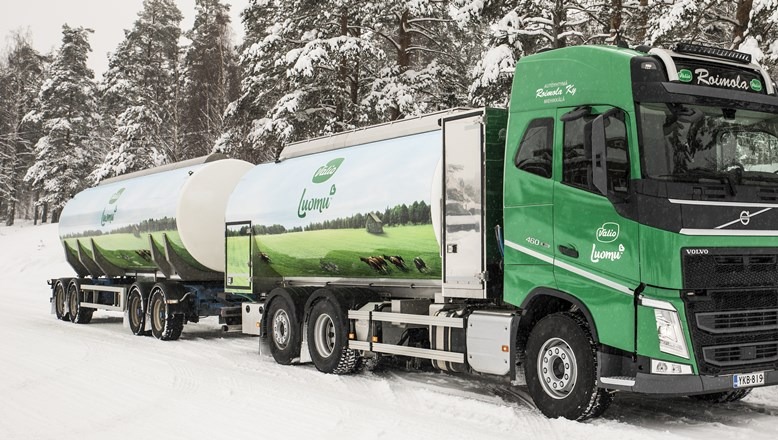Gasum and Valio are launching cooperation as Valio introduces a biogas-fueled tractor unit in the collection of organic Valio Luomu milk in February 2019.

Image: Valio introduces biogas-fueled milk collection trucks. Photo: Courtesy of Gasum.
The vehicle running on biogas is part of Valio’s objective to make the milk production chain entirely carbon neutral. Valio is implementing the circular economy in practice when supplying waste fractions from its production process for biogas production.
From February onwards, a total of 10% of all organic Valio Luomu milk will be collected using a biogas-fueled Volvo LBG 460 vehicle. Valio aims for a carbon-neutral milk chain and the introduction of the biogas-fueled vehicle is an important step towards the aim. The milk collection vehicle will operate in Southern Finland. In addition to organic milk, the truck will also collect basic milk from Valio producers.
“The new traction unit is Finland’s first gas-fueled heavy-duty vehicle intended for milk distribution. I’m happy and proud of the fact that those buying organic Valio Luomu products can now make an even more environmentally friendly choice when buying Valio Luomu milk,” says Valio Category Manager Mirva Tollet.
The transport use of biogas can help reduce fuel lifecycle greenhouse gas emissions by up to 85%. Heavy-duty transport accounts for 40% of Finland’s transport emissions and that is why there is pressure specifically in enterprises’ transport logistics to reduce emissions. Depending on the size class, the annual emissions of a single tractor unit correspond to those of around 40–50 cars. Valio aims to make the operating hours of the new gas-fueled distribution vehicle as long as possible to maximize the emission reductions achieved.
“It’s great that Valio is using environmentally friendly biogas produced from biowaste as a fuel and that way reducing emissions from transport logistics. Taking part in the production of renewable biogas is circular economy at its best as it helps to recover biowaste efficiently for further use. To be able to cut transport emissions, we need frontrunners like Valio,” says Gasum Sales Manager Juha-Matti Koskinen.
Gasum and Valio are collaborating to produce biogas from Valio’s waste fractions. Reusing residual fractions from the production process is a particularly good way to implement circular economy as the organic matter created in biogas production can be utilized further as recycled fertilizer products.
“Our processes generate waste fractions that are unnecessary for us but suitable for the production of biogas. This means we supply raw material to Gasum and then use Gasum-produced LBG as a vehicle fuel. We also have other biogas-fueled vehicles, such as a delivery vehicle and company cars used by our personnel. Reducing the carbon footprint of logistics is important for our aim to achieve carbon neutrality in our entire milk chain as the number of kilometers clocked up is huge when milk and dairy products are transported,” says Valio Development Manager Petteri Tahvanainen.
Valio is considering the addition of more gas-fueled vehicles to its logistics fleet in the future, with the coverage of the biogas distribution network for heavy-duty vehicles in particular playing a decisive role in that context. Gasum provides heavy-duty transport with support for mobility fueled by low-emission gas in the Nordic countries. Gasum is currently investing in the construction and opening of 50 new gas filling stations for heavy-duty vehicles in Finland, Sweden and Norway by the beginning of the 2020s.
Source: Company Press Release
